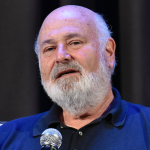Such has been the drama of the 2020 US election and its aftermath that opportunities for reflection have been in short supply. The BBC’s Today programme tried gamely to fill the gap providing two minutes of space for James Naughtie to ruminate on the election.
But how would veteran BBC journalist, the late Alistair Cooke, have observed the psychodrama of Donald Trump in his White House bunker? Naughtie was a great admirer of Cooke – presenting a tribute to him in 2008 to mark what would have been Cooke’s 100th birthday, where he eulogised about Cooke’s entwined metaphors and his commitment to language, to explain and to describe.
Indeed, Cooke’s personal approach to journalism was, at the time, a departure from the more formal language and structure of other commentators.
While there are many sources for us to learn about the US now, it’s worth considering the influence Cooke had in how people in Britain saw America, over nearly six decades. Cooke’s Letter from America radio programmes (which went out on BBC Radio’s Home and World services) remain the longest-running speech programme hosted by one individual, consisting of 2,869 broadcasts made between 1946 and 2004.
Cooke wanted to explain the US to British listeners through his Letters, making the country more accessible to an audience that, particularly in the early days, had few other sources of information to help them understand US culture and politics.
Amid the blaze of coverage of Trump’s downfall on both legacy and new media, listening back to Cooke’s broadcasts about the demise and defeat of previous US presidents recalls a kind of journalism rarely seen, or indeed heard, in contemporary broadcasting. It’s fascinating – and often very funny.
In a 1979 Letter, Cooke compared the American and British experience of electioneering – talking of his astonishment coming back to Britain 20 years earlier to cover an election to find no motorcades, skywriting aeroplanes or posters with slogans such as “Eden Is Leadin’” (referring to Anthony Eden, prime minister from 1955 to 1957).
The drama of rallies with the post-war Labour prime minister Clement Attlee, Cooke recalled, were the sort you might muster in the US “for a particularly heated parent-teacher meeting”.
But he also had shrewd insights, based on his decades of reporting. In the same Letter he mused on the increasing public relations aspect of politicking. “Mr Nixon,” he noted, was “the first American to be convinced that Richard Nixon as God created him was not quite right for exposure to the multitude.” Nixon subjected himself to a makeover by advertisers – something that Cooke concluded became a Faustian pact as Nixon became trapped by the image.
While contemporary commentators have tried to analyse what led to Biden’s victory and Trump’s defeat, Cooke was there before them in working out what could go wrong for a one-term incumbent. Musing on Jimmy Carter’s defeat by Ronald Reagan in the 1980 election he said:
Instead of doing what Franklin Roosevelt did in four elections, never mentioning the name of his opponent, [Carter] decided to make Ronald Reagan and his character the issue. The tactic backfired. The actual sight of Reagan in the debate obliterated the nuclear button-pressing Dr Strangelove of Mr Carter’s fancy.
If Trump had perhaps taken the time to go back to these Letters, he might have learned from Carter’s mistakes and rethought his constant attacks on “Sleepy Joe”.
Changing world
What is also different about Cooke’s reporting from today is the way his own experience is an essential part of the narrative. For example, Cooke’s letter about Bill Clinton’s defeat of George H.W. Bush in 1992 shows the manner in which Cooke reflects on both his own character as well as his work as a journalist. Listeners were treated to a very particular view drawn from Cooke’s experience living among the New York elite, a subjective gaze of the personal viewpoint.
In the early part of that Letter, Cooke described his posting to the US and being “slightly disturbed that I was going to have to move myself and my family to Washington,” when he was appointed chief US correspondent of The Guardian. He was very relieved when his editor gave him permission to stay in New York because, he said, it was “the best news base and the best home base for travel”.
In the latter part of the same letter, analysing why Bill Clinton beat George H.W. Bush, Cooke brings himself into the story by describing himself, revealing his attitudes and biases:
I am – my generation are – probably more at home with WASPs and a Catholic friend or two than with the polyglot white, black, Latino, brown, Asian, multicultural society that America has increasingly become. But Clinton reached out to it… This was never clearer than on Thursday morning, when the New York Times carried a front-page photograph … Clinton in jeans, worn jeans of course, a check wool shirt… Not a suit, not a neck-tie, not a button-shirt in sight. “Well,” I said to my wife, “can you believe this, there is the next president of the United States and his buddies.” “He,” said my wife sternly, “is the president of those people and he dresses like them.” Quite right. Along with the passing of George Bush, we shall see, I fear, the passing of the blue blazer.
Cooke’s personal reporting in the Letters meant not only that they could be compelling listening, but they created a new style of reporting in which his viewpoint became the dominant way many elite listeners understood radio. While mainstream media may have dispensed with this style of reporting on their bulletins, he presaged a now-popular media form.
Listening back to Letters from America, they may not resemble modern Radio 4 reporting, but they recall successful new forms, such as the BBC’s Americast or CNN’s Election 101. Alistair Cooke may not have been the inventor, but he can at least be cast as the forerunner of the political podcast.
Glenda Cooper receives funding from the British Academy
She has also secured special permission from both the BBC (who own the copyright) to examine the broadcasts and from the Cooke family estate (who own the copyright) to analyse the transcripts and publish extracts from them.
Howard Tumber receives funding from the British Academy. He has also secured special permission from both the BBC (who own the copyright) to examine the broadcasts and from the Cooke family estate (who own the copyright) to analyse the transcripts and publish extracts from them.










